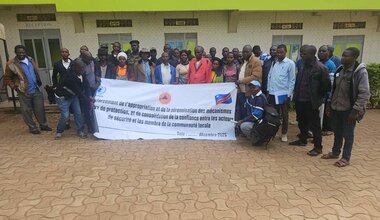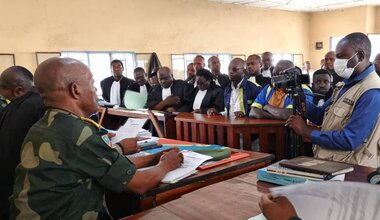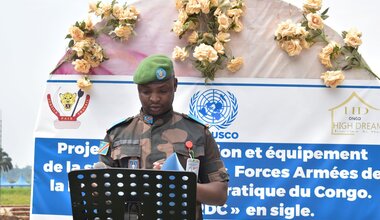MONUSCO supports Magistrates’ educational session in Kalemie
Kalemie – 9 through 10 July 2015: For two days, Kalemie hosted a purely educational session aimed at building Magistrates’ technical and professional capacities as well as moral skills with a view to making them more efficient and conscientious when carrying out their duties.
The educational session was jointly organized by the Kalemie Prosecutor and MONUSCO Justice Support and Correction Administration sections.
Indeed, the District of Tanganyika, to be turned to a Province shortly, has a Big Prosecution Court based in Kalemie and 6 others based at the courts of peace in the administrative capital of each of its territories: Kongolo, Manono, Moba, Kalemie, Nyunzu and Kabalo. These different prosecution offices were newly established and operate in difficult conditions.
During his visits to the different territories, MONUSCO Justice and Correction Administration Support Section assessed the needs in terms of training for the magistrates working in the Prosecutor’s office, after identifying the irregularities committed by the magistrates likely to undermine the smooth administration of Justice. The analysis of the needs in terms of training led the Public Prosecutor and Justice Support Section to develop terms of reference for the educational session during which, the irregularities committed by magistrates were reviewed and discussed.
Altogether 25 magistrates including 2 women participated in the educational session: 12 from Kalemie, 4 from Manono, 4 from Kongolo, 2 from Moba, 2 from Nyunzu and 1 from Kabalo. The opening ceremony was marked by speeches respectively made by the Representatives of the Chief of MONUSCO/Kalemie and the Public Prosecutor.
On the first day, 4 presentations were given by members of MONUSCO/Kalemie Justice and Correction Administration Support Section with a focus on “MONUSCO’s mandate and their staff legal protection. The speaker gave an overview of the United Nations Mission in the DRC by raising the different UNSC Resolutions and Mandates.
Then, he adressed the issue of privileges and immunities for the United Nations staff in general and MONUSCO in particular in light of the SOFA agreements signed between the DRC Government and MONUC that was later on renamed MONUSCO”; other concepts around the issue of interrogatory techniques for defendants and hearing of witnesses, conditions of preventive custody and a theme on judiciary protection of victims and witnesses in the DRC were also reviewed.
The second day, entirely dedicated to judiciary officials’ presentations, focused on “the elements that determine an offence and the repressive system of common place offences in Tanganyika, the offence of sexual violence and the special procedure to address them, the Ethics and professional code of ethics for Magistrates working for the Prosecution office and the Independence of the Public Prosecution: relations with the political, administrative and security officials”. On that day, participants were reminded the basic concepts.
 UN
UN United Nations Peacekeeping
United Nations Peacekeeping




